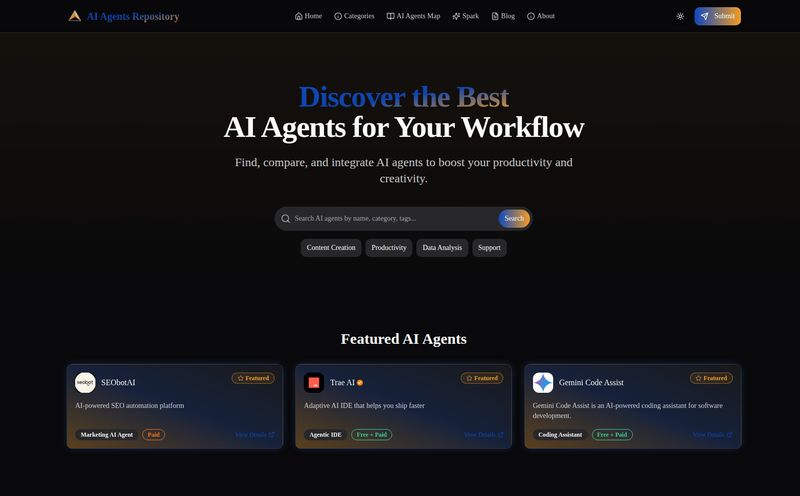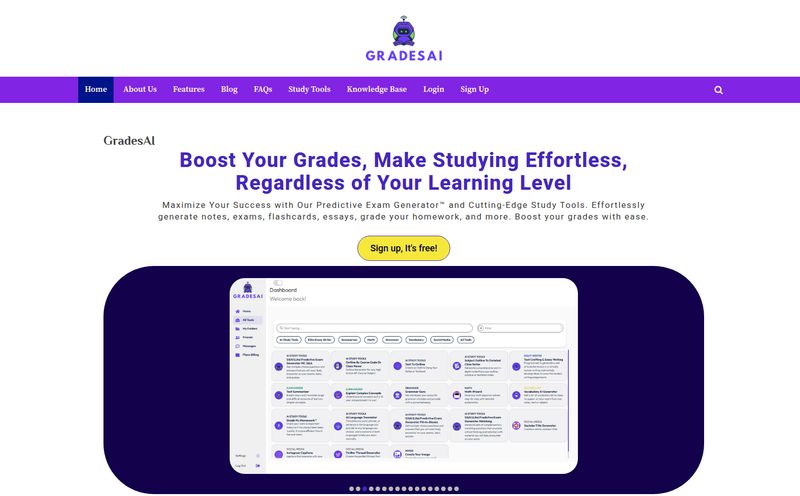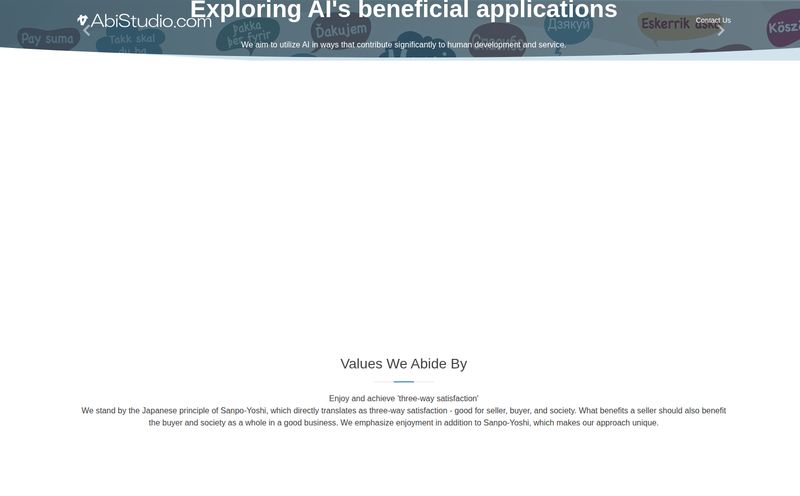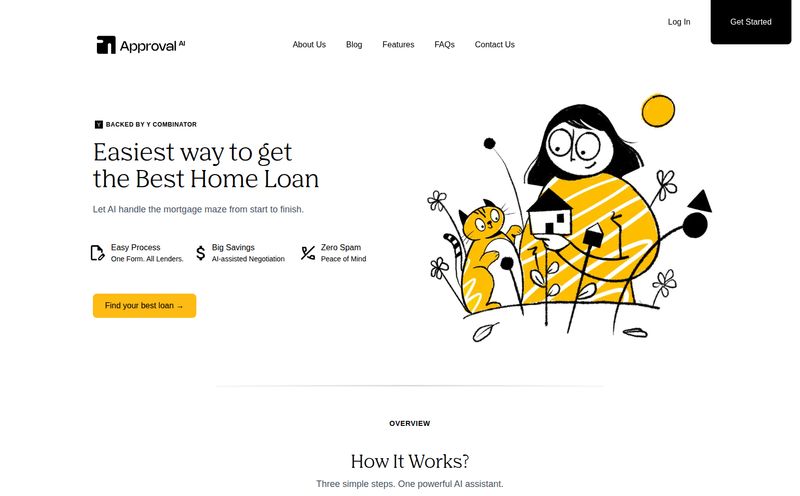If you’re in security, DevOps, or even just IT-adjacent, your life is probably noisy. Not just ‘the-server-fan-is-loud’ noisy, but a constant, screaming cacophony of alerts, notifications, and vulnerability reports. It’s like trying to hear a whisper during a rock concert. Most days, we’re just drowning in data, and the truly important signals get lost in teh static. We’ve all been there, staring at a dashboard with 1,000+ “critical” alerts, wondering where to even begin.
For years, the industry’s solution was… more tools. Another dashboard. Another subscription. Another stream of alerts to add to the pile. It’s a cycle of madness. So when a platform like Veriom comes along and calls itself an “AI Security Brain for Modern Systems,” my cynical-veteran-blogger-sense starts tingling. Is it just more marketing fluff, or is there something genuinely different here? I decided to take a look.
What Exactly is Veriom? (And Why Should You Care?)
In a nutshell, Veriom positions itself as an AI-powered intelligence layer that sits on top of your existing infrastructure and tools. Think of it less as another security guard and more as the central command center director. It’s designed to manage cybersecurity and compliance in real-time across your entire modern mess of systems—your cloud infrastructure, your software delivery lifecycle, and even your own AI models.
The core promise is that it plugs into the tools you already use, sucks in all that chaotic data, and then makes sense of it. Instead of just flagging a problem, it aims to provide the full context and even suggest or automate the fix. Their big claim? They can deliver actionable insights in under 15 minutes. That’s a bold statement in a world where just triaging a single incident can take hours, if not days.
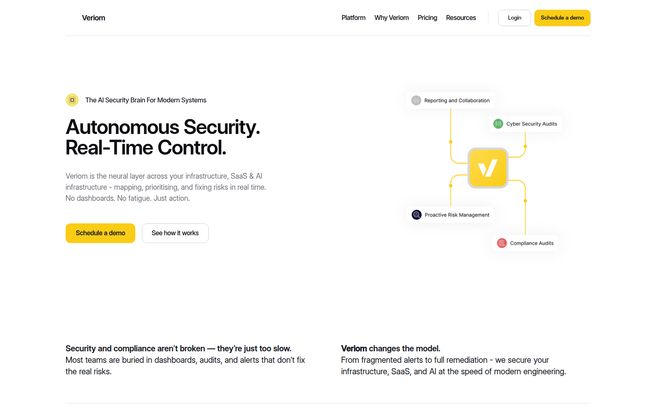
Visit Veriom
Taming the Beast of Alert Fatigue
This is the part that got my attention. Alert fatigue isn’t just an annoyance; it’s a genuine security threat. When your team is so overwhelmed by false positives and low-priority warnings that they start ignoring them, that’s when the real threats slip through. I once worked with a company whose security team openly admitted to auto-archiving any alert with the word “informational” in it. Scary stuff.
Veriom’s approach to this is what they call “full-context remediation.” It’s a fancy term, but the idea is simple. Instead of just saying “Hey, this server port is open,” it connects the dots. It might tell you, “This port is open, it’s connected to a service with a known vulnerability, that service processes sensitive customer data, and leaving it open violates SOC 2 control 3.4a. Here’s the command to fix it.”
See the difference? It’s not another alarm bell. It’s the expert who not only points out the problem but also explains the so what and the now what. This shift from detection to remediation is, in my opinion, where the real value is. It’s about turning data into decisions, not just more data.
Putting Compliance on Autopilot
If alert fatigue is the noisy monster in the corner, then compliance is the slow, soul-crushing grind. The endless spreadsheets, the manual evidence gathering, the pre-audit panic. It’s a necessary evil that consumes a ridiculous amount of time and resources.
This is another area Veriom aims to tackle with its Continuous Compliance module. The idea is to automate the process of checking your systems against compliance frameworks like SOC 2, ISO 27001, HIPAA, and others. Instead of a once-a-year fire drill, your compliance posture is monitored constantly.
"Security and compliance aren't broken, they're just too slow. Veriom changes the model - remediation, we shrink your remediation windows down to zero and cut out all the noisy, middleman engineering."
This quote from their site really hits the nail on the head. Audits become less of a painful event and more of a… report. Because the system is always on, always checking, you can theoretically generate an audit report on-demand. For any company that has to deal with auditors, that sounds like a dream come true.
The Veriom Platform: A Quick Tour of the Features
Veriom breaks its offering down into four main products. Let’s take a quick look at what they do.
Cybersecurity Assurance & Risk Management
These two go hand-in-hand. This is the core security functionality we’ve been talking about. It’s about moving from a reactive stance (“Oh no, we’ve been breached!”) to a proactive one (“We’ve predicted this combination of factors could lead to a breach, so we neutralized it.”). By understanding the relationships between assets, vulnerabilities, and controls, the platform aims to predict and defuse risks before they become incidents. It's the difference between patching a dam after it springs a leak versus reinforcing it before the storm hits.
Continuous Compliance
We touched on this one already. Think of it as your automated, 24/7 internal auditor. It continuously checks your setup against your chosen compliance frameworks and flags any deviations, allowing you to stay “audit-ready” at all times. This is a huge potential time and money saver.
Agentic Assurance
Okay, this is the really futuristic stuff. Agentic Assurance is designed to use autonomous AI agents to test and secure your other AI systems. As more companies deploy their own large language models (LLMs) and other AI, securing them becomes a whole new challenge. This feature is still on a waitlist, which tells you it’s cutting-edge. It's a clear signal that Veriom is thinking not just about today's problems, but tomorrow's as well.
The Good, The Bad, and The Realistic
No tool is a silver bullet, and it's important to have a balanced view. From my perspective, here’s how Veriom stacks up.
The Upside
The potential to centralize and automate security and compliance is massive. The fact that it integrates with your existing tech stack is a major plus; nobody wants to rip and replace their entire security apparatus. The focus on proactive remediation over simple alerting is, I believe, the correct direction for the entire industry. It’s a genuine attempt to solve the root problem of signal vs. noise.
The Reality Check
There are a few things to keep in mind. First, any AI system is only as good as the data it’s fed. Veriom’s effectiveness will depend heavily on the quality and completeness of the data coming from your integrated tools. Garbage in, garbage out, as they say. Second, a platform this comprehensive will inevitably require some initial setup and configuration. This isn't a browser extension you install in five minutes. Finally, with its most futuristic feature, Agentic Assurance, being waitlisted, you're buying into a platform that is still growing into its full vision.
So, How Much Does This AI Brain Cost?
Ah, the million-dollar question. Or maybe the ten-thousand-dollar question? It’s impossible to say from the outside. Veriom's website has a section for “Flexible Pricing for Fast-Moving Teams,” which is industry-speak for “Request a Quote.”
This is pretty standard for enterprise-grade B2B SaaS. The cost will almost certainly depend on factors like the size of your infrastructure, the number of users, the specific modules you need, and your overall usage. While the lack of a public pricing page can be a bit frustrating for smaller teams just trying to budget, it makes sense for a tool that needs to be tailored to complex environments. Don’t expect a simple three-tiered pricing plan here.
Who is Veriom Really For?
Based on its capabilities and positioning, Veriom isn’t for everyone. If you’re a solopreneur or a small business with a handful of applications, this is likely overkill.
Veriom is clearly built for security leaders (CISOs), GRC (Governance, Risk, and Compliance) professionals, and platform engineering teams inside medium-to-large organizations. It's for companies that have a complex, modern tech stack (think multi-cloud, microservices, CI/CD pipelines) and are struggling to keep up with the operational overhead of securing it and keeping it compliant. If your job involves a title with the word “Security,” “Compliance,” or “Risk” in it, you’re the target audience.
Final Thoughts
I started this with a healthy dose of skepticism, as I do with any tool that promises to solve all our problems with “AI.” But after looking at what Veriom is trying to do, I’m cautiously optimistic. It’s not just another alert-generating machine. It's built on a sound premise: that the only way to manage modern IT complexity is with an intelligent, automated, and context-aware system.
It won't magically solve all your problems overnight. You’ll still need smart people and good processes. But it could be the force multiplier that finally allows those smart people to focus on real threats instead of drowning in noise. It’s a tool that might just give security and compliance teams the one thing they need most: a chance to breathe.
Frequently Asked Questions About Veriom
- What is Veriom?
- Veriom is an AI-powered platform designed to provide real-time cybersecurity and compliance management. It acts as a central intelligence layer, integrating with your existing tools to identify, analyze, and remediate risks across your infrastructure and software lifecycle.
- How does Veriom help with alert fatigue?
- Instead of just generating more alerts, Veriom provides full-context remediation. It connects data points to show the full impact of a risk and often provides or automates the solution, reducing the noise and allowing teams to focus on what truly matters.
- Does Veriom replace my existing security tools?
- No, and that's one of its key strengths. Veriom is designed to integrate with your existing technology stack (like your SIEM, cloud provider tools, and vulnerability scanners). It enhances them by providing a centralized brain to make sense of all the data they produce.
- Is Veriom suitable for small businesses?
- Veriom is primarily aimed at medium to large enterprises with complex IT environments. Its features for deep integration, continuous compliance, and risk management are most beneficial for companies with dedicated security, DevOps, and compliance teams.
- What is Agentic Assurance?
- Agentic Assurance is a forward-looking feature (currently on a waitlist) that uses autonomous AI agents to test and secure an organization's own AI models and systems. It's designed to address the unique security challenges presented by the rise of AI.
- How do I get pricing for Veriom?
- Veriom uses a custom pricing model. To get a price, you need to contact their sales team through the "Request a Quote" form on their website. The cost will be tailored to your organization's specific size and needs.
